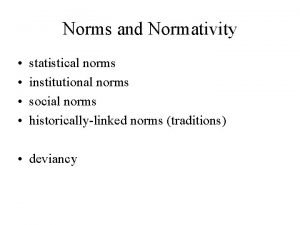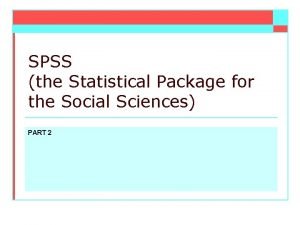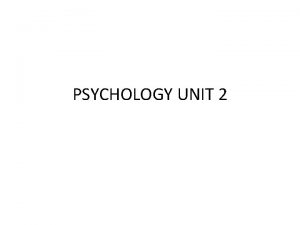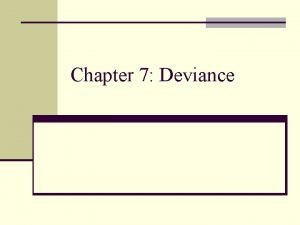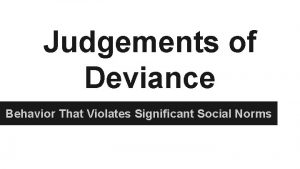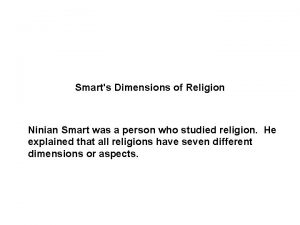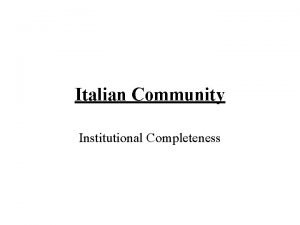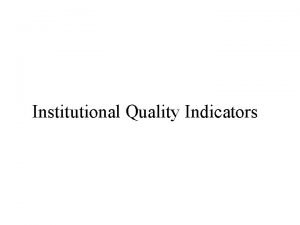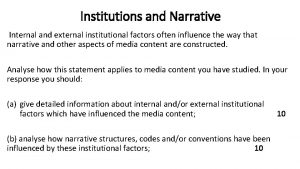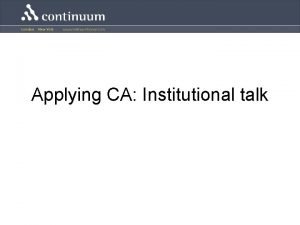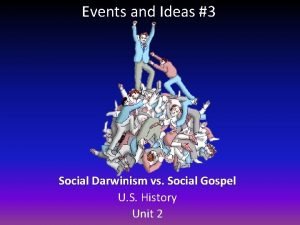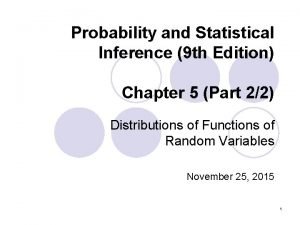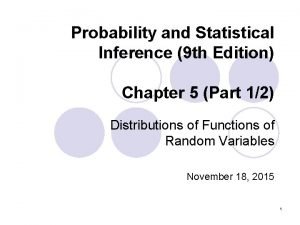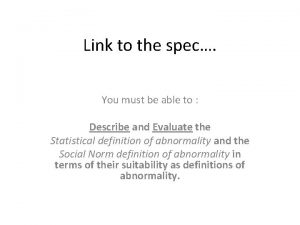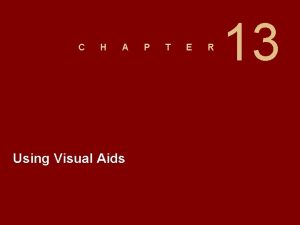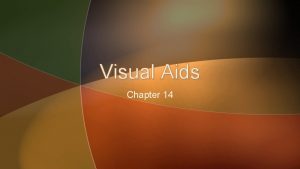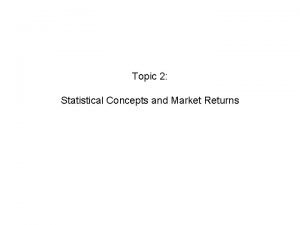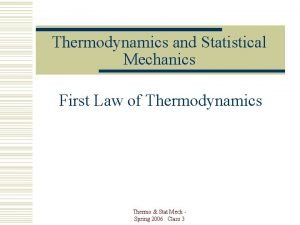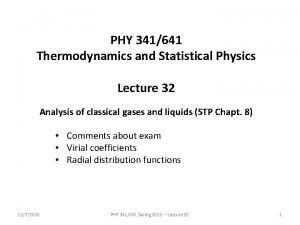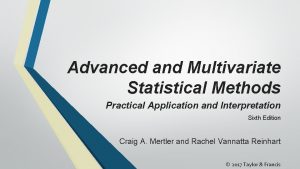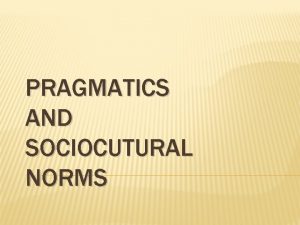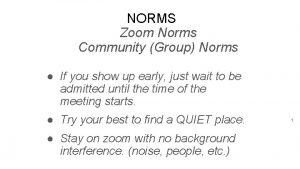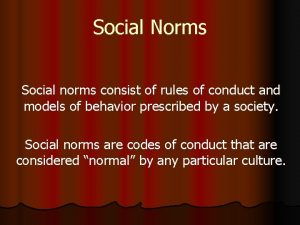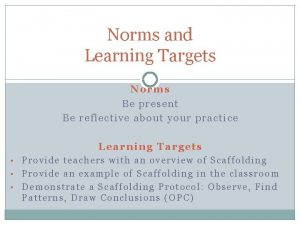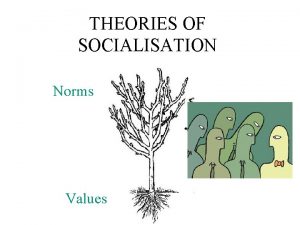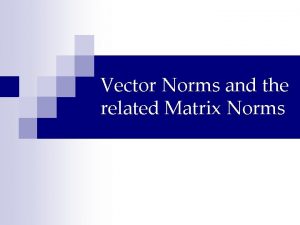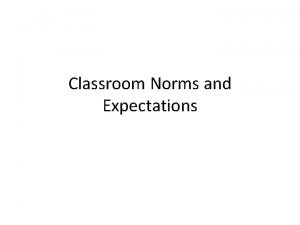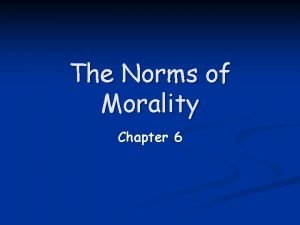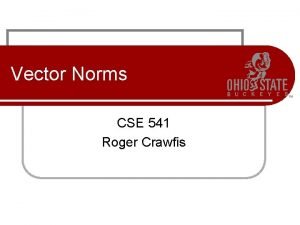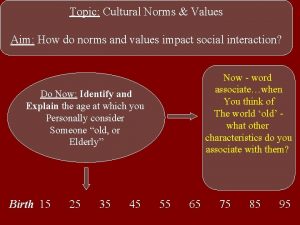Norms and Normativity statistical norms institutional norms social





































































- Slides: 69

Norms and Normativity • • statistical norms institutional norms social norms historically-linked norms (traditions) • deviancy

Normative Functions • rationality (or sanity) • control • science

The Norms of Madness • Why is madness historically and culturally specific? • Who is best qualified to determine someone’s sanity? • How does a determination of insanity change one’s status?

The Norms of Science • At what point or under what circumstances can we call a certain activity science? • What distinguishes the science of different periods, for instance, that of the Ancients from that of the Moderns? • What is a paradigm, especially in a scientific context?


Isaac Newton (1642 -1727)

Albert Einstein (1879 -1955)

Johann Wilhelm Möbius

Theme: Responsibility • Blame is difficult to determine in large-scale social problems, for instance, in education and the so-called failures of the educational system to achieve certain objectives (basic skills, English levels, job readiness, prevention of disorder or crime, cultivation of good habits, moral fortitude, work ethic, etc. ). • What are some other large-scale problems, either ongoing or historical, in which blame, guilt, or responsibility are difficult to determine?

Friedrich Dürrenmatt (1921 -1990) • Swiss • The Physicists (1962)

Characters • • Fräulein Doktor Mathilde von Zahnd Marta Boll Monika Stettler Isaac Newton, Albert Einstein, Johann Wilhelm Möbius • Oskar Rose, Lina Rose • Richard Voss

Content 1. What institutions are described or implied in the initial directions at the start of the play? 2. What events have recently disturbed the villa where the physicists live? 3. What qualifications do the nurses have to protect themselves? 4. How does Newton describe his purpose in life? How does he justify the murder of a nurse? 5. Whom does Newton claim to be? Why does he maintain the fiction that he is Newton?

Content 6. How does the doctor react to Voss’ complaints? 7. Who visits Möbius? How does Möbius react to this visit? Why does he react this way? 8. What relation is there between Möbius and Nurse Monika? 9. How does Möbius react to her disclosures?

Stage Directions • Why would Dürrenmatt create stage directions that no one but a reader (and the actors) could perceive? • What are the Aristotelian unities? What does their mention condition in the audience? • passage: 9 -11

Class • What are the class associations around Les Cerisiers (probably an allusion to Chekhov’s play of this name)? • How have these distinctions changed or become anachronistic in the present of the play? • How is modern society structured, based on the description of the first couple of pages? • What types of patients populated the sanatorium— what is meant by elite in this context?

Genre • Despite the violence and somewhat serious themes, the play has comic elements. • Identify some of these. • What do you think tragicomedy means? • language: 14, 15, etc. • irony: 18, etc. • absurdity: 21, etc.

Technology vs. Use • Newton develops the technology/use dilemma quite well. • What is behind the idea that the Inspector wants to arrest him for “creating” the atomic bomb? • passages: 22 -23

Responsibility • What defense does Newton offer to this charge? • Is it logical or compelling? • What would it mean not to “turn on the light”?

Application: Blame • We have talked about blame and responsibility. • What excuse does the doctor make in regard to the murders? • passage: 28, cf. 34 (establishing measures)

Rationale • Möbius has reasons for his behavior. • What, at this point, do you think his rationale is for alienating his family and refusing Nurse Monika?

Attitudes towards Religion • Is Dürrenmatt critical of religion, or specifically, a certain kind of religious belief or practice? • What is his tone in connection with Herr Rose and Möbius’ wife?

King Solomon

PUD • What do you believe the Principle of Universal Discovery to be? • Is it real or simply a delusion? • What is King Solomon’s role in the play so far, and why would he be used in this way?

Möbius’s Motive • Why does Möbius kill Nurse Monika? • Again, this entails some predictions about what is really going on.

Painters • • Leon Spilliaert (1881 -1946) Giorgio De Chirico (1888 -1978) Max Ernst (1891 -1976) Paul Delvaux (1897 -1994) Rene Magritte (1898 -1967) Yves Tanguy (1900 -1955) Salvador Dalí (1904 -1989) Balthus [Balthasar Klossowski de Rola] (1908 -2001)












































For Next Time • Read: The Physicists, Act Two • Images: Matisse, Léger
 Institutional norms
Institutional norms Difference between social norms and values
Difference between social norms and values Statistical package for social science
Statistical package for social science Apa itu social thinking
Apa itu social thinking Social thinking social influence social relations
Social thinking social influence social relations Institutional support and entrepreneurship
Institutional support and entrepreneurship Roles and importance of institutional investors
Roles and importance of institutional investors Deviation from social norms
Deviation from social norms Values vs norms
Values vs norms Behavior that violates significant social norms is called
Behavior that violates significant social norms is called Greensboro sit-ins
Greensboro sit-ins Institutional medicaid
Institutional medicaid Catering provision
Catering provision Institutional presidency definition
Institutional presidency definition Eu institutional triangle
Eu institutional triangle Institutional affiliation definition
Institutional affiliation definition Experiential dimension of religion
Experiential dimension of religion Institutional promotion examples
Institutional promotion examples Product vs institutional promotion
Product vs institutional promotion New directions for institutional research
New directions for institutional research Richard tuffs
Richard tuffs What is institutional completeness
What is institutional completeness Institutional voids
Institutional voids In5210
In5210 Institutional risk examples
Institutional risk examples Institutional quality index
Institutional quality index Institutional catering definition
Institutional catering definition Institutional anomie theory definition
Institutional anomie theory definition Sonia liou
Sonia liou Institutional factors media
Institutional factors media Institutional calendar
Institutional calendar Institutional building adalah
Institutional building adalah What is institutional marriage
What is institutional marriage Ibes guidance
Ibes guidance Institutional disclosure
Institutional disclosure Institutional talk examples
Institutional talk examples Institutional revolutionary party
Institutional revolutionary party Institutional units
Institutional units Institutional development program
Institutional development program Unisa institutional repository
Unisa institutional repository Institutional risks
Institutional risks Upspace institutional repository
Upspace institutional repository Unisa research repository
Unisa research repository Institutional development plan sample
Institutional development plan sample Ucf office of institutional equity
Ucf office of institutional equity Institutional presentation
Institutional presentation Institutional aggression
Institutional aggression Institutional learning outcomes examples
Institutional learning outcomes examples Institutional framework for business
Institutional framework for business Institutional advertising
Institutional advertising Institutional framework for business
Institutional framework for business Institutional advertising
Institutional advertising Close advertising
Close advertising Social darwinism vs social gospel answer key
Social darwinism vs social gospel answer key Statistical symbols and meanings
Statistical symbols and meanings Proof of chebyshev's inequality
Proof of chebyshev's inequality Probability and statistical inference 9th solution pdf
Probability and statistical inference 9th solution pdf Statistical notation
Statistical notation Distinguish between synchronous and statistical tdm.
Distinguish between synchronous and statistical tdm. Hypothetical evidence examples
Hypothetical evidence examples Statistical product and service solutions
Statistical product and service solutions Statistical infrequency strengths
Statistical infrequency strengths A visual aid used to show statistical trends and patterns.
A visual aid used to show statistical trends and patterns. A visual aid used to show statistical trends and patterns.
A visual aid used to show statistical trends and patterns. Statistical institute for asia and the pacific
Statistical institute for asia and the pacific Statistical product and service solutions
Statistical product and service solutions Statistical concepts and market returns
Statistical concepts and market returns Dulong petit law
Dulong petit law Thermodynamics and statistical mechanics
Thermodynamics and statistical mechanics Advanced and multivariate statistical methods
Advanced and multivariate statistical methods
